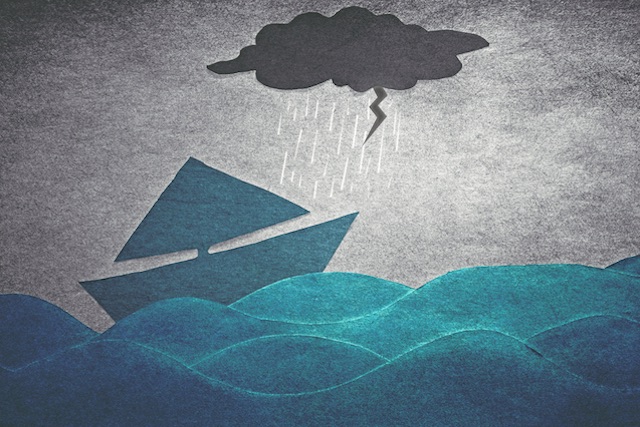
“Our ultimate freedom is the right and power to decide how anybody or anything outside ourselves will affect us.” ~Stephen Covey
My partner was a well-respected bank manager in a small country town. He was rising through the bank hierarchy with good prospects for further promotion. We were thought of as a happy, close-knit family that contributed in every way we could to the local community.
Unbeknownst to us, the bank was conducting a re-assessment of their country branches. Several of the smaller banks would close and all staff would be dismissed.
Frightening words were on our lips—redundancy, fear of the unknown, financial difficulties, unexpected change, personal loss.
Little did we know how much a huge obstacle suddenly dumped in our path would affect us, particularly emotionally. Our hopes and dreams for the future—moving back to the big city to live in a “castle” with a fantastic view—were dashed.
We started to name and blame bank personnel. We asked lots of questions but the answers remained elusive.
Our totally negative and blaming attitude kept us stuck in an emotional hole. We couldn’t see how necessary it was to accept the situation emotionally, before we could do the practical stuff required to relocate and rebuild.
There was a pre-requisite to the rebuild but we missed understanding this, until…
A close friend started sending us a card every six or so days. In each card was written a quotation, the words of a song, or sentences our friend had read that she thought would be constructively helpful.
One day when a card arrived, I was feeling very down. I read the words “Could we change our attitude, we should not only see life differently, but life itself would come to be different.” (Katherine Mansfield)
The word attitude jumped right out. Changing our attitude was the pre-requisite we had missed seeing. What a realization—such a powerful one. It became the catalyst our family needed to accept our situation, stop feeling sorry for ourselves, and start to map out a recovery plan.
And it all started from a simple, thoughtful act. Our friend had helped us survive.
How can you, too, be a survivor when loss, health issues, financial challenges, or accidents block your path?
Not all your problems will be as overwhelming as the one I’ve described. Nevertheless, every problem, including insignificant ones, can be worrying, even numbing. Knowing what to do will ensure that the physical and emotional scars left by your experience will not be very deep.
Following are my five Dos and Don’ts that I documented from our experience, to help you work through every bump and hump, minor or major.
This is not your usual list of “five practical steps.”
Rather, the Dos and Don’ts are what reshaped our attitudes and emotions—a reshaping that was the pre-requisite to solving our practical issues—moving both our location and professional direction.
5 DOs and DON’Ts to Ensure Your Survival
1. DON’T bury your feelings.
Denial, anger, and anxiety are normal feelings that can accompany setbacks. They’re also positive things—stepping stones on the road to acceptance and recovery. It’s natural, too, to feel completely overwhelmed and powerless.
First, recognize and accept that the situation is real. Allow your feelings to surface and overflow. Have a cry, a yell, and a rave. You’ll empty yourself of the worst of your negative feelings and be quicker to mend and move on.
We found that taking walks in a nearby park, among trees, provided a peaceful environment for us to clarify our feelings and come to grips with the above emotions.
2. DON’T act like a victim.
Things get worse when you focus on yourself and act like a victim.
Quit blaming yourself, others, or external circumstances for what has happened. Going over and over what you should have done solves nothing. Wallowing in self-pity and beating yourself up takes your power away.
Believe in yourself and your abilities. Believe that you are awesome enough to push through to a brighter future. Read inspiring books or put sticky notes with motivational quotes around the house. Say them out loud as you walk past. Take back your power over the situation.
For us, mindfulness was a great tool to help us snap out of the victim mentality. We sat quietly for ten minutes a day and concentrated on our breathing, taking our focus away from our worries. The activity was very calming.
Being mindful gives your mind a rest. You’ll problem solve more easily with a calm mind. You’ll move from victim mode into action mode, as we did, to hasten the healing process.
3. DO keep the communication channels open.
At these difficult times, keep friends and family close by as listeners and supporters. Find someone you can confide in about the challenges you face. Together, brainstorm possible ways to move ahead.
Talking and sharing helps you see a different perspective so you can come up with creative solutions. It will also help you see that you’re not alone because others have been through equally challenging circumstances.
I found keeping in touch with my usual contacts on social media helped lighten my load. I enjoyed logging on to sites like Tiny Buddha, where I received encouragement from others in the blogging community.
4. DO be flexible.
Accept that ups and downs are an inevitable part of life. Remembering that life moves through cycles of peaks and troughs will help you look forward to the rewarding times that lie ahead.
These words from Alexander Bell, in one of our cards, gave us both a jolt. “Sometimes we stare so long at a door that is closing that we see too late the one that is open.”
Be flexible; adjust your thinking and your goals. Becoming paralyzed and inflexible by the reality of your situation might deny you the opportunity to follow a new, exciting direction. Adapt so you can survive and thrive.
Previously we were choosing to be miserable. Now we started asking empowering questions such as, “What choices do we have here?”
This form of questioning encouraged flexibility and enabled us to expand our thinking. We found ourselves probing possible alternative— in what employment areas outside banking is financial expertise sought after?
Being flexible isn’t easy. However, we found it absolutely necessary before we could move forward.
5. DO focus on the good things in your life.
Focusing on what you don’t have stops you from seeing all the wonderful things that you do have. Appreciate what you have, and the things that are working out well. You’ll gain a better perspective on life.
Rejoice in any progress you make. Reward yourself with small treats such as coffee with friends. Each step and celebration provides motivation for the next one. You’ll find relief from the stress that has enveloped you.
As a family we made a list of things we were thankful for such as good health. We included positive aspects of moving back to the city—more time to spend with our families, wider educational and sporting opportunities.
Being thankful gave us a more positive outlook. Even the “castle” came back into view.
We placed the following words where we could see them every day, and that helped too. “If you have nothing to be grateful for, check your pulse.” It’s something to smile about, eh?
Final Thoughts
Setbacks, tragedy, loss, and failures are part of life. So the joy and success we find in our daily life depends largely on the way we handle life’s problems—our attitude—as well as on our ability to keep going, no matter what.
In other words, never give up.
Setbacks are golden opportunities to learn and grow. It’s up to you to transform the pain into purpose.
Ship in a storm image via Shutterstock
About Jenna Drew
Erral and Jenna are passionate about helping people leave their ordinary, blah kind of life behind, and empowering them to live a satisfying and fulfilling life. Download their free book From Blah to Blastoff at http://successjennarator.com/welcome/ that will challenge you to take action right now to live the life you really want to live. Find them also on Twitter @Jenna935.












 Though I run this site, it is not mine. It's ours. It's not about me. It's about us. Your stories and your wisdom are just as meaningful as mine.
Though I run this site, it is not mine. It's ours. It's not about me. It's about us. Your stories and your wisdom are just as meaningful as mine.
I will share excellent internet freelancing opportunity… three to five hours of work /day… Payment each week… Performance depending bonuses…Payscale of $6k to $9k a month… Only few hrs of spare time, desktop# or laptop, elementary understanding of internet and dependable web-connection needed…Have a visit to my disqus_profile for more info
I needed this right now…thanks. 🙂
Hi Pammy. It’s great that you found the post helpful. Keep focusing on the good things in your life. Best wishes from Jenna
Yours is really an inspiring story. Focusing on the good is always the key to move on. How could we know what’s on the next page if we keep on reading the previous page again and again. Always hope for the best. All the very best to you and your family.
Hi Sreeram. What a great comment to start my day. Your third sentence is still tossing around in my mind. Appreciate your encouragement. Thanks for stopping by.
I want to show great! work opportunity… three to five hours of work daily… Weekly paycheck… Bonus opportunities…Payscale of $6k to $9k /a month… Just few hours of your free time, any kind of computer, elementary understanding of web and stable connection is what is required…Get informed more about it by visiting my profile>page
So your partner was making enough money from being a bank manager that you all were able to entertain the idea of moving into a home you refer to as a “castle,” but then a bank did what banks always do – put profits over the community, threatening many people’s livelihoods, including yours. You went from benefiting from the system to becoming just as irrelevant to the bank as anyone else in the community.
The problem or life lesson to be learned here isn’t about attitude, it’s about how the exploitive philosophy of capitalism affects people. Our economic system is founded on the Three Poisons and things will only continue to get worse if we don’t wake up as a society and change how we see and treat each other. We don’t live in individually isolated bubbles where everything in our lives is a “lesson” about improving our attitude. We will only truly be happy when so many in our society don’t have to suffer for the happiness of a few.
Thanks, Stephanie, for sharing. You’ve provided some food for thought. Have a great week. Jenna.
Hey Jenna,
Great post. I agree with you. However we all must sit in the victim mentality for a while as it passing through a channel of the cycle. Staying there for too long is unhealthy, but the victim mentality is apart of the cycle.
jolt when you read attitude from your mates quote (what I mate I might add – how thoughtful and caring) was because you were ready for it. Had that quote came two weeks earlier you may not have taken it on with the same amount of vigour you describe.
But what I like most about the post is you really described how we go about getting back on track from a set back.
Thank you.
Rachel.
That’s a great response, Rachel. I love the way you point out the necessity to pass through a cycle. As you say, we were ready at that particular point. I think people who share, as you have, are people who care. Others read your insightful comments and learn from what you add. Thanks heaps. from Jenna.
I will guide you to this excellent internet job opportunity… 3-5 hours of work daily… Payment at the end of every week… Bonus opportunities…Payscale of six to nine thousand dollars /a month… Only few h of free time, any kind of computer, most elementary understanding of Internet and dependable connection needed…Get more& info on my disqus*page
Thank you. I read this word for word & my thinking is so much more positive. Ive had an unexpected loss & am having a difficult time – your kind words of wisdom are much appreciated. Thank you.